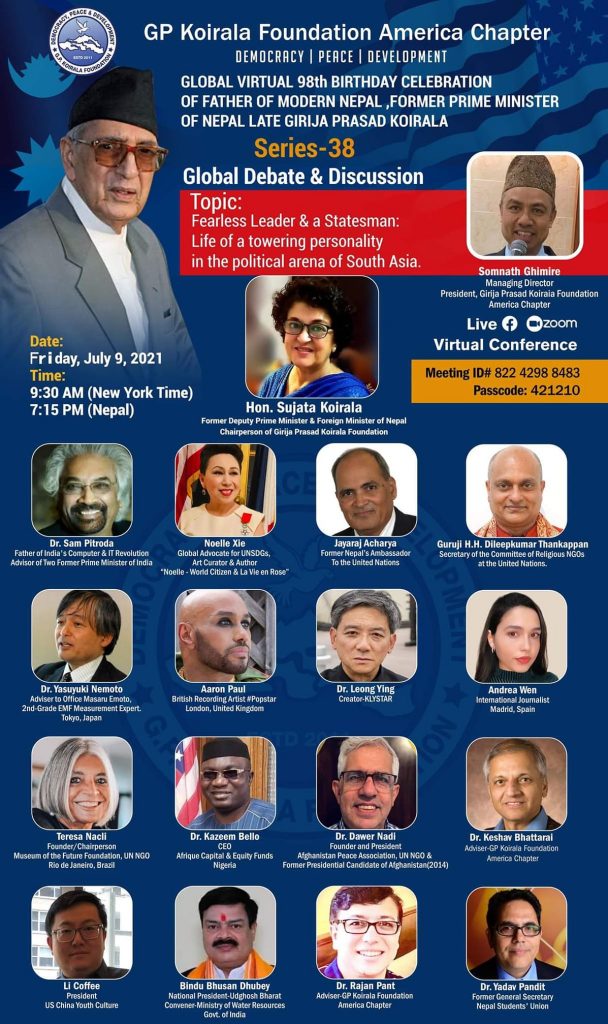Chair of the program,
Distinguished participants,
Friends,
First of all, I would like to express my respectful tributes to my father Girija Prasad Koirala, – former prime minister, former head of state, and leader of democratic movements in Nepal, on his 98th birth anniversary. As the president of the Nepali Congress, he took the initiative to end the decade long Maoist armed conflict in Nepal. He led the process of mainstreaming them into a peaceful constitutional democratic politics.
I would like to extend my sincere greetings and warm welcome to all distinguished guests and participants on this virtual event from around the world. I appreciate you all taking time to join this programme.
I thank Somnath Ghimireji for organizing this event to mark the 98th birth anniversary of Girija Babu.
Affectionately addressed as Girija Babu, my father was a born rebel in the political Koirala family. As his only child, I hardly got time to spend with him. He was most of the time fighting from his hideouts against the repressive Rana rulers. Girija Babu worked as a labour in Jute Mills, organized political movement by organizing labour union. He was arrested and put in prison for several years under rigorous conditions. From that day, he became even more committed to the democratic movement and never looked back.
It is hard to do justice to his personality in a few minutes. He was not only my father and guardian, but also a guide and towering leader of the democratic movement in Nepal.
I will be brief about his role in democratic movement, opening up economy, initiating economic reforms after the restoration of democracy in 1990, and his contributions to the country and international community.
Democracy remains in our blood. The struggle started from my grandfather, my father and uncles were all in politics. My uncle led the popular movement of 1950-51. After the first ever general elections in 1959, my uncle B.P. Koirala led the government. But the king dismissed this popularly elected government in 18 months. The king not only imprisoned the elected prime minister, all ministers, and political leaders, but he also dismantled the parliamentary system of governance. Girija Babu was active in organizing the party to revolt and restore the democratic system. He remained at the forefront of all political movements.
Girija became the first elected Prime Minister after the restoration of democracy in 1990. He opened the economy and initiated reform process. He invited private sector to make contributions in the building of economy. Schools, colleges, universities, hospitals, airlines in private sector started under his leadership. It was during his time as prime minister that social sector reforms were initiated. Roads and communication facilities were extended to the countryside in the remote areas of Nepal. He believed that well connected Nepal and opened up economy will do better both at home and abroad.
He put in place the regulatory and structural framework for economy. He invited foreign investments and accordingly amended domestic laws to facilitate its smooth flow. The foundation, he laid, is sustaining the economy till today despite the weak performance of the governments in following years.
In 2005, he took the initiative to end the Maoist bloodshed in the country. The country was gripped in fear and confusion. Girija Babu took all parties in confidence and worked to create an environment of providing security to the common people, restoring confidence in the nation and freeing the society from fear. On his call, thousands of youths joined the democratic movement. He wanted this fight to be the last one, as he used to say, ‘Let the future citizens not have to fight for democracy lifelong as I did.’
Girija Babu was the architect of the Nepali peace process. He brought them from the war to peaceful constitutional process. The signing of the Comprehensive Peace Accord in 2006 formally ended the decade long Maoist conflict. He put in place the elected constituent assembly to write the constitution by the people’s representatives. It was under his leadership that the elected assembly voted to do away with the autocratic monarchy and establishment of the republic Nepal in 2008. His mantra to strengthen the foundations of democratic Nepal was: Ekata, Sahamati, Sahakarya (unity, understanding and collaboration and cooperation).
He was concerned with the plight of downtrodden people and showed his commitment for their upliftment. He instituted scholarships for students coming from the poor families. He started mid-day meals to encourage the school enrollments. There are several initiatives he took for their welfare and upliftment. He remained the most active leader to travel the nook and corner of the country and get acquainted with the problems of the people. At a time when people suffer from covid19, he would have been prompt in procuring vaccines and protect people’s life.
On foreign policy, he was a practical and pragmatic leader with due regards to geographical realities and sensitivities. He strengthened the roots of independent foreign policy. Girija Babu always maintained a delicate balance in foreign policy, earned the trust and confidence of our big neihgbours and the international community all at a time. He always insisted on maintaining consistency in foreign policy to earn credibility.
We can go on and on in recalling his contributions and dedication to the country and the people throughout his life.
I welcome the distinguished participants to this virtual programme, and look forward to hearing from them.
I wish the programme all success.
Thank you so much !
Video Link :-https://fb.watch/6EQEUcsuZB/

